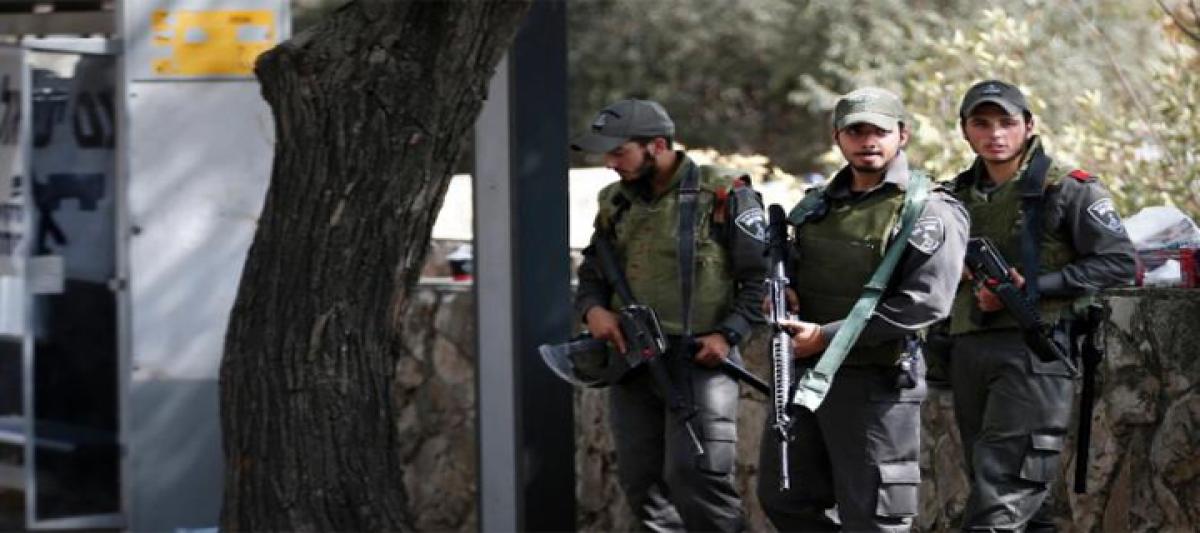Live
- Bihar: Spotted deer dies due to heart attack in Banka district
- Mushtaq Ali T20: Shami to spearhead Bengal bowling attack, Gharami named captain
- Kharge's clarion call to oust Maharashtra's BJP-backed MahaYuti
- Why Ukraine’s Use of US Missiles Against Russia Could Lead to World War 3
- SDM slapping case: Protestors demand release of Naresh Meena
- 'Back to basics, march to future' approach reason for India's success, says PM Modi at Rio G20 Summit
- PKL Season 11: Telugu Titans humble table-toppers Haryana Steelers by 22 points
- Centre fine-tunes new railway line projects on Delhi-Chennai high density corridor
- JICA & BCG Unveil the “Forest Stack” at COP 29: A Visionary Concept for Transforming Forest Conservation and Management through Digital Public Infrastructure
- Stay Alert: Excavation and damage to the natural gas pipelines will result in legal action
Just In

x
Highlights
An Israeli soldier was killed Sunday in a shooting at a bus station in Beersheba, further stoking fears of a full-blown Palestinian uprising as diplomats scramble to quell tensions.
An Israeli soldier was killed Sunday in a shooting at a bus station in Beersheba, further stoking fears of a full-blown Palestinian uprising as diplomats scramble to quell tensions.

The evening attack in the southern city was the first after a day in which unrest between Palestinians and Israelis seemed to somewhat ebb, following more than two weeks of relentless violence.
Police said a man, thought to be Palestinian, entered the bus station armed with a pistol and knife, killing the soldier and wounding 10 other people, including four officers.
The gunman himself was then killed and an African bystander was shot by security forces who mistook him for a second gunman.
The identity of the assailant was not immediately known, and there was no claim of responsibility for the attack.
But it was praised by militant groups in Gaza, with Hamas calling it a "natural response to Israelis assassinations" and Islamic Jihad saying it was a "normal answer to Israeli crimes".
Diplomatic moves to halt the more than two weeks of unrelenting violence gained steam, meanwhile, with US Secretary of State John Kerry saying he planned to meet both the Israeli and Palestinian leaders in the coming days.
Clashes also broke out in the West Bank city of Hebron, where three attacks occurred on Saturday.
On the Gaza border, three Palestinians were moderately wounded by small calibre bullets during clashes with Israeli forces Sunday after they tried to breach the border fence, Gaza medics and the Israeli army said.
Israeli Prime Minister Benjamin Netanyahu rejected an idea from France that would see international observers sent to Jerusalem's Al-Aqsa mosque compound.
Clashes at the compound between Israeli police and Palestinian protesters in September preceded the current wave of violence.
Muslims fear Israel will seek to change rules governing the site, located in Israeli-annexed east Jerusalem.
The site is sacred to Muslims and Jews, who refer to it as the Temple Mount. Jews are allowed to visit but not pray there to avoid provoking tensions, and Netanyahu has said repeatedly he has no intention of changing the rules.
"Israel cannot accept the French draft resolution at the United Nations Security Council," Netanyahu said.
France's ambassador to Israel, Patrick Maisonnave, was meanwhile summoned to the foreign ministry for 0730 GMT Monday over the resolution, French and Israeli diplomatic sources said.
With international concern mounting, Kerry said he would meet both Netanyahu and Palestinian president Mahmud Abbas later this week.
Attacks defy crackdown
Checkpoints have been set up in Palestinian areas of east Jerusalem, where many of the attackers have come from, and some 300 soldiers on Sunday began reinforcing police.
Israeli police also began erecting a wall between Palestinian village Jabel Mukaber and Jewish neighbourhood Armon Hanatziv to protect it from firebomb and stone attacks.
Tel Aviv authorities have barred cleaning and maintenance employees from schools during times when students are present, with parents concerned over possible attacks against children.
Most of the attackers have been young Palestinians wielding knives and believed to be acting on their own.
Including alleged assailants, 41 Palestinians have been killed since the upsurge in violence began on October 1, while eight Israelis have died.
Violent protests have also erupted in east Jerusalem, the occupied West Bank and the Gaza Strip.
Israel on Sunday closed the only civilian crossing from Gaza into Israel, except for humanitarian cases, while damage was being repaired.
Incident at holy site
In yet another sign of tensions, ultra-Orthodox Jews illegally visiting a West Bank site holy to them were assaulted by Palestinians, two days after Palestinians torched the site.
The group of about 30 religious students from Jerusalem had travelled to Joseph's Tomb in the northern city of Nablus despite not having the required authorisation from Israel's military.
They told police they intended to repaint the shrine after the fire.
Israeli authorities said Palestinian police beat at least some of them with their batons and the butts of their guns.
A group of Palestinian civilians arrived afterwards and also beat them, according to Israeli police.
Joseph's Tomb, inside a compound in the Palestinian refugee camp of Balata in Nablus, has been the scene of recurring violence between Israelis and Palestinians.
The shrine is under Palestinian control and off-limits to Israelis except on escorted trips organised by the army.

Next Story
More Stories
ADVERTISEMENT
© 2024 Hyderabad Media House Limited/The Hans India. All rights reserved. Powered by hocalwire.com







